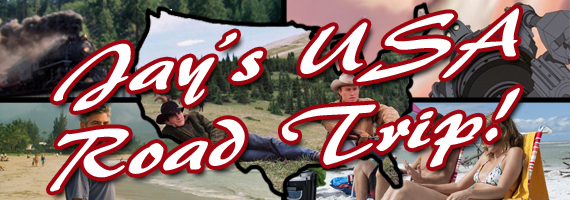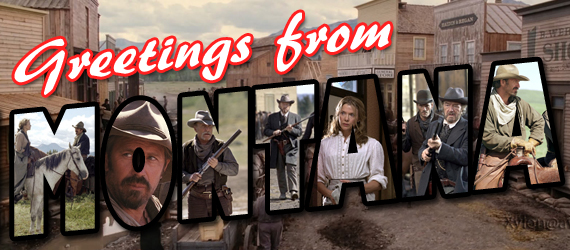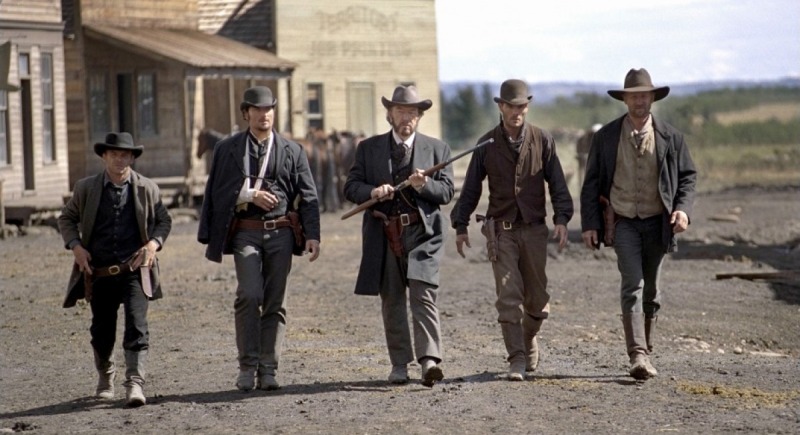
I’ve always wanted to travel across America. I’ve been a few times, to the major tourist attractions – Disneyworld in Florida, Vegas in Nevada, Cheers in Boston – but there’s so many places I’ve never seen in person, and most likely never will. Fortunately, there’s a solution, and it’s my own personal remedy to all life’s problems: movies. There’s been a movie set literally everywhere. Everywhere! So, this feature sees me cinematically visit a new state every week, through a film that was set there. You can read my journey so far here. Next up: Montana!
A small-time cattle operation, led by Robert Duvall’s Boss Spearman, sets up grazing near the town of Harmonville, with the intention of moving on before they do any major damage to the local vegetation. When one of their number doesn’t return from a supply run to the town, Spearman and his right hand man Charley (Kevin Costner) head to Harmonville in search of their friend, only to find he’s been beaten and locked up by the town marshal (James Russo), at the behest of Harmonville’s ruthless land owner Baxter (Michael Gambon). Baxter, it would seem, isn’t too keen on free-grazers around his land, and he makes it all too clear to Boss and Charley that if they plan to hang around, bad things are going to happen to them and their herd. Unfortunately for everyone, Charley and Boss are more concerned with enacting vengeance for their man than anything else, so needless to say things get a mite violent in town.
I haven’t seen that many westerns in my time, but by and large the ones I have seen I’ve enjoyed, so I can refer to it as a genre I appreciate. However, the problem with westerns is that, if you see too many, they all tend to merge into one big sandy mess, because there’s only so many stories that are told within the confines of cowboys and the Old West. This is something that has plagued Open Range in my memory as, though I saw it for the first time only a few years ago, many of the plot details have since faded, save for a few stand-out moments. Fortunately, these moments were more than enough to entice me into a re-viewing of this western, directed by Costner, and as modern westerns go this is quite a good one.
Don’t go expecting buckets of action and bullets like the 3:10 to Yuma remake (which I really like as well), this is more along the lines of the likes of Unforgiven; a character-driven piece that focuses on Charley, Boss and their young hired hand Button (Diego Luna). There is some action mind, but it doesn’t occur until the last reel, and it’s well worth waiting for. In fact, so little takes place throughout the first two thirds of this film that calling it uneven would be something of an understatement, but the wide expanses of dialogue, scenery and insults act as a tantalising foreplay for what is to come later. The final shoot-out is a joy to behold, despite involving far fewer people and iconic weaponry than other classics like The Wild Bunch. There were some instances during the build-up where I became noticeably bored, but it becomes worth it in the end. That’s not to say the pacing couldn’t be improved, as there are some elements and scenes from those early stretches that could be considerably edited down or eschewed entirely – bearing in mind the most exciting thing that happens is a puppy being rescued from a waist-high rain river – and I’d go as far as to say that there’s probably too many scenes of Duvall and Costner just talking to one another, with a script that is a long way from being efficient with its dialogue.
However, the relationship built up between these two characters, as well as with Button and Mose (Abraham Benrubi), the other members of their clan, is believable and well realised. There’s a real sense of a family unit there, with Charley as the stoic, brooding father, Button and Mose the wrestling, rough-and-tumble sons and Boss the experienced, sage-like grandfather. Add Annette Bening as Sue, a townsperson who catches Charley’s eye, and plenty of supporting townsfolk including Michael Jeter and Kim Coates and you’ve got a great cast full of interesting characters who all bring a lot to their roles, regardless of how little screen time they’re given. The only weak link really is Gambon, who performs fine with the material he’s given, even getting to use his native Dublin accent for a change, but he just isn’t around long enough to fully earn the title of the film’s big bad.
Character-wise, the plot plays faster and looser than a series of Game of Thrones in terms of offing loved ones before you’ve really gotten to know them and, whilst that helps to understand motivations, it negatively impacts the viewer’s enjoyment of the film. Then again, I suppose that’s the point, as this isn’t supposed to be a feel-good romp. There are times when you need that sick feeling in your gut, and Open Range is only too happy to provide it. However, there is humor around to lighten the mood when required – Charley and Boss attempting to use Sue’s delicate china teacups, for example. Also, as I’ve mentioned, the last half hour is tremendous fun, and I find one of Costner’s last lines in the film to be downright hilarious, and something I’d like to use in my own life. Let’s just say his attitude to relationships is by today’s standards somewhat outdated, which is only to be expected really, seeing as the film takes place in 1882. There’s an unfortunate misuse of slow motion in the finale, and an excessive denouement that rivals The Return of the King, making this overall a film for genre fans only. If you’re not a fan of westerns, this won’t change your mind, but for fans there’s plenty here to satisfy. And the confrontation between Charley and Butler (Coates), the man who beat up Mose? Worth your admission price right there, as is the manner in which Duvall’s Boss takes care of a man hiding the otherside of a wall.



